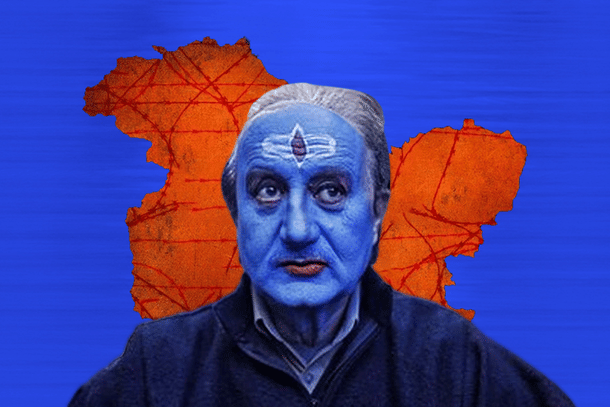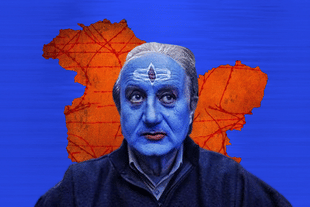Culture
The Kashmir Files: Why The Pop Culture Narrative Matters In The Larger Political Discourse
Tushar Gupta
Apr 01, 2022, 12:46 PM | Updated 12:57 PM IST
Save & read from anywhere!
Bookmark stories for easy access on any device or the Swarajya app.


To begin with an anecdote similar to what many may have encountered at some point in their respective lives. The story here is of the author’s neighbour, a young man, almost done with his teens, and as is the case with many young people in that age bracket, a rebel without a cause. A routine day is spent in the gym in the Chandigarh suburbs, figuring out the right permutations of protein shakes and exercises.
Thus, a couple of years ago, when the farmers first began their protests, the immediate response of this young boy, quite like many in his social media vicinity, was that of anger against the establishment.
For the next two years, he questioned the stance of the government, and even though a student of economics himself, sided with flawed socialist schemes in agriculture over private sector investments, questioned the existence of ‘Hindu Nationalism’, a phrase the Instagram generation of today is quick to pick up from certain Western publications and their authors in Delhi. The questions went on, mostly culminating into some harsh words for the Prime Minister.
Naive behaviour, for most elderly observers, but in the exuberance of youth, the establishment is always perceived as being on the wrong side of morality. Blame the sway of peer pressure in an age where the minds are most vulnerable, an inevitable consequence of pop culture.
The same peer pressure inspired this young man to book a show of The Kashmir Files, and suddenly, he had different questions to ask. For someone born in 2001, to be ignorant of atrocities committed only a decade before was a rude awakening. What hurt him more was not the lack of knowledge of the genocide in Kashmir against the Hindus but many such stories, from Godhra to Bengal, that he was unaware of. What was supposed to be a casual viewing of a movie everyone was talking about became a lesson that left him rattled, disgusted, in shock.
As a movie, The Kashmir Files is far from being a cinematic masterpiece or a production one would remember for its theatrical experience, as is the case with many Academy Award-winning movies or superhero fests, and yet, it has grown into a saga that has transcended the walls of the theatres and single screens across the world. The numbers serve as a testament to the movement it has become and the silent majority market that has been craving, wishing, hoping, and even begging for certain stories to be told.
The staggering box-office numbers in the face of two big releases, one by Akshay Kumar and the other by Sanjay Leela Bhansali, in India and The Batman in the global markets validate the existence of the market for stories that are generally considered to be taboo.
For many in India, the unspeakable, unimaginable atrocities and crimes committed are stories not worthy of being given screen space, for they dent the idealism and sugarcoated reality of the world many storytellers dwell in. The Kashmir Files has smashed that glass ceiling to smithereens.
The success of The Kashmir Files also reiterates the importance of pop culture in the larger social and political discourse, more importantly. As expected, the movie opened to mostly negative reviews, as the entire lobby of obsolete and boring blabberers, or critics as they are generally known, criticised the movie for being shot poorly, for showcasing one community in poor light, for not being gentle in its telling of a story about a woman who is fed rice soaked in the blood of her husband and then gang-raped for days, or being too violent. For those unwilling to look beyond their political biases, declaring the movie as an outright lie was the only option.
These critics were responded to not by the movie's actor, director, or producer but by the people who had lived and lost their loved ones to the genocide. The response was not in the numbers alone, but the outpouring of emotions was visible inside many cinema halls, across social media as teary-eyed audiences recalled the heinous days their families had suffered.
For the young critics who wanted to dismiss the movie as government propaganda, the voices of the forgotten community were too loud to be ignored. A story, an emotion, and countless voices, suppressed and silenced for three decades, had finally found the medium. This is the impact of pop culture.
Today, the narrative on Kashmir has been turned on its head. From the 1990s, when the genocide was justified in the name of the minority community occupying plum postings by noted journalists, to the literature that was churned out every week in newspapers, magazines, both local and international, elaborating on the crimes committed by the Indian forces deployed there while conveniently ignoring the underground network of terrorists and militants sponsored by the overly generous neighbour, to the whole ‘Hindu Nationalist Government’ tag the current regime has been bestowed with; today, the peddled narrative worth a generation has been dented significantly by one movie. Again, this is the impact of pop culture.
However, all said and done, the movie's success has ensured that it does not remain an anomaly that is eventually lost to the pages of history. The commercial success of the entire venture, unexpected and unprecedented, should encourage more promoters and producers in the future for more stories to be told. Kashmir Files, Godhra Files, Bengal File…we must not stop telling the stories. Yes, the political climate is an enabler, but the oxygen is money, for it is indispensable to the sustenance of storytellers and the sustainability of the narrative within pop culture.
When it comes to pop culture, another aspect in the larger political discourse warrants attention, which is how to perceive the playground of cinema.
Many well-meaning samaritans are pointing out the fallacies of the cinema world through short clips on Twitter and Instagram, helping audiences realise the steady diet of anti-Hindu content that have been served to them as some magnum-opus. Yes, there is the whole shock and awe factor, the reluctant realisation amongst many about the sins of Bollywood, but it does not take away from the social, economic, and political importance of the medium, or its unstoppable growth.
The pursuit of owning the pop culture narrative will not be successful by pointing out the shamelessness of the existing storytellers but displacing them with the strength of the newer ones, those who have their ears to the ground and their hearts closer to the country.
Put simply, one does not become a gladiator by standing at the gates of the coliseum. Do not aim to boycott, but to displace. Do not aim to correct how Bollywood may work, but to ensure the right stories get an equal representation and audience. Consequently, the evolution of the industry will happen itself.
Beyond the political calculations, India is a nation of young voters, many aged 14-28. They consume pop culture as they inhale oxygen, and they are influenced by pop culture as any young mind is, and they take it to their hearts. Stories that they read, watch and listen to become a part of their thought process, unknowingly and inevitably. In the era where a grander universe exists online, to downplay the importance of pop culture is to vacate a space critical to the thought process of the country’s future.
The scale of success of The Kashmir Files may not be the fate of every production or attempt to tell a similar story. There would be hiccups, challenges, and even setbacks as more stories are told, more pages of history are turned, and more young minds are rattled, yet the show must go on.
Like the author's neighbour, the churning and unlearning of young minds should be encouraged and enabled, even if it is slow and unrewarding, without any transactional benefits immediately.
Stories ignored for decades must now occupy the mainstream space.
Also Read: One Of The Many Positives Of 'The Kashmir Files' Is That It Shows The Importance Of Documentation
Tushar is a senior-sub-editor at Swarajya. He tweets at @Tushar15_





